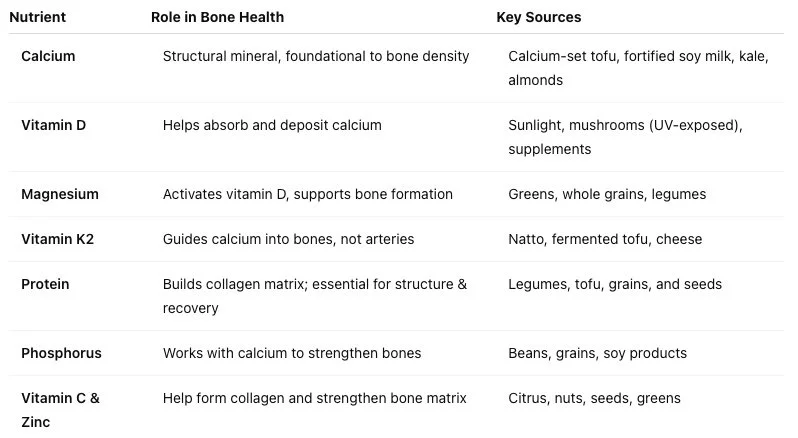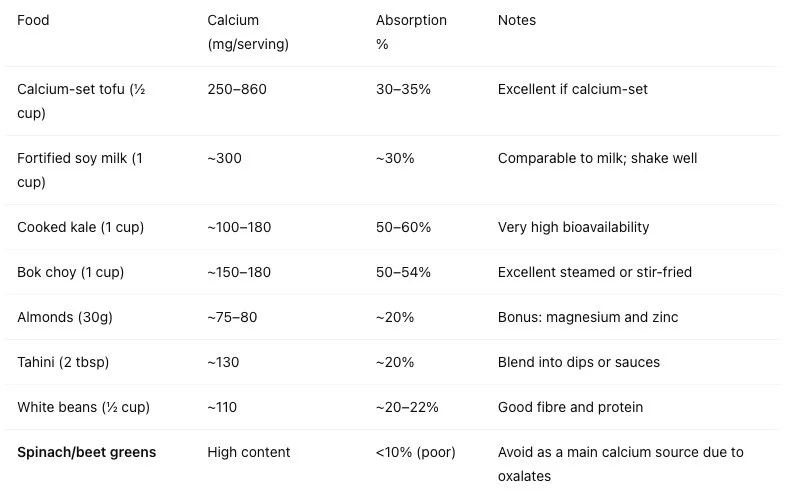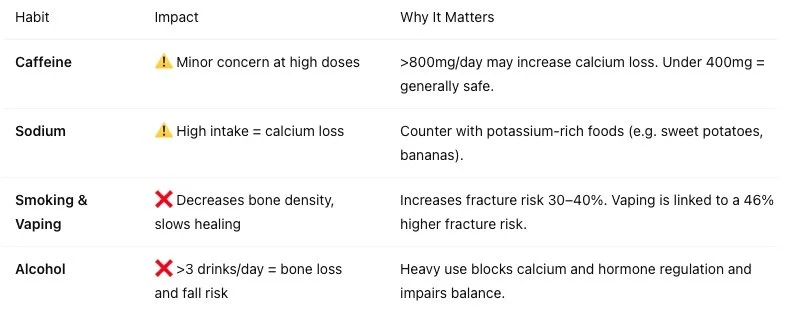Do You Need Dairy for Strong Bones? Let’s Rethink It
🧠 Why This Matters
We've long heard it: Drink milk for strong bones. But is that the whole truth?
Modern science says: Not quite. Bone strength isn’t built on calcium alone, and dairy isn’t your only (or even best) option.
Let’s unpack what your bones really need, how to get it from plants, and why diversity—not dogma—is the real key to staying strong.
🥛 The Dairy Debate: Milk Isn’t the Whole Story
Dairy is often viewed as the foundation of bone health, but its benefits vary depending on the specific type and overall dietary context:
Milk: Studies show mixed results—some suggest benefit (especially in countries like the U.S., where dairy products are routinely fortified), while others link high milk intake to increased fracture risk and oxidative stress. It’s not universally protective.
🧠 Note: These studies are observational—they reveal patterns but can't prove cause and effect. Confounding factors (like other lifestyle or health issues) may influence outcomes.
Yoghurt and Cheese: These fermented dairy products consistently show positive associations with bone strength. They may offer better calcium bioavailability and probiotic benefits that help reduce inflammation.
🧠 Note: While fermented dairy shows consistent benefits, the specific role of probiotics in human bone health is still being explored.
Fortification Matters: Milk fortified with vitamin D performs better in fracture prevention than non-fortified versions. Always check the label.
🌿 Takeaway: Dairy can support bone health but isn’t essential. Fermented options like yoghurt and cheese offer stronger evidence. For those on plant-based diets, well-chosen alternatives can cover all the same ground—and then some.
🦴 What Bones Actually Need
Bones are living tissue, not just made of calcium, but built through a synergy of nutrients:
🧠 Pro Tip: Nutrients work together. For example, vitamin D helps absorb calcium, magnesium activates vitamin D, and vitamin K2 directs calcium where it belongs.
🌿 Calcium-Rich Plant Foods (with Absorption in Mind)
Not all calcium is absorbed equally—bioavailability is the key.
💡 Pro Tip: Shake fortified plant milks before serving to ensure calcium isn't left at the bottom.
💡 Bonus: Cooking, blanching, or soaking some vegetables and legumes can reduce oxalates and phytates, improving nutrient absorption.
🏋️♀️ Movement Builds Bones
Strong bones don’t just come from food—they need physical pressure to stay dense.
✅ Weight-Bearing Exercise: Walking, jogging, resistance training, jumping, dancing, yoga—these stimulate bone growth through “osteogenic loading.”
📌 Note: Higher-intensity movements (like jumping or lifting weights) create greater bone-building effects than low-impact activities like walking.
❌ Swimming and cycling, while great for fitness, don’t load the bones enough on their own.
Even short, regular sessions of strength training can help prevent osteoporosis.
☕ Lifestyle Habits That Help or Harm
🍽️ Final Takeaway: You’ve Got Options
Strong bones don’t depend on milk. They’re built by:
🍲 Nutrient-dense, plant-forward meals
☀️ Daily sunlight or D supplementation
🏋️♀️ Strength-based movement
❗Avoiding risky supplements or lifestyle habits
🧠 Your bones reflect your whole life, not just your calcium intake.
Choose variety. Choose a movement. Choose wisdom over marketing.
📌 Disclaimer
This article is for general information only. For medical advice or treatment relating to bone health, speak with a qualified healthcare provider.




